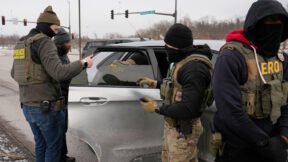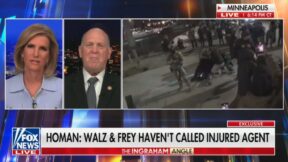Chris Hayes Calls For Ceasefire in Israel-Hamas War: Ground Invasion ‘Will Usher in Far, Far Worse’
Chris Hayes is backing a ceasefire in the Israel-Hamas war as Israel ramps up for an extended ground invasion of Gaza.
Hamas carried out a shocking series of coordinated terrorist attacks in Israel on Oct. 7, killing 1,400 Israelis and abducting 200 others. In response, the country has been conducting strikes inside Gaza, which Hamas controls. Given the fog of war and the unreliability of reported casualty figures, it is difficult to say how many Palestinians have been killed in military strikes. One of the higher estimates puts the number at around 7,000.
On Friday’s edition of All In, Hayes said a large-scale ground invasion would mean many more dead Israelis and Palestinians. He pointed to the U.S. reaction to the September 11 attacks, and cautioned Israel against a similar response.
Here are his remarks:
You’ve probably seen these images over the past three weeks, pasted on lamp posts and held up at vigils around the world of the faces of the names of the more than 200 Israeli hostages taken by Hamas terrorists when they attacked southern Israel and committed a mass atrocity, slaughtering men, and women, children, and the elderly. Recently there have been a number of despicable incidents of people so full of hate of Jews,they’ve actually ripped these images down, as if that could erase the humanity of the people whose images are on them.
And for anyone who lived through 9/11, those images bring back memories of the thousands of fliers of the missing put up all over Manhattan in the frantic days after that terrorist attack. There were so many family members left grieving. And there was a small group of them that took that grief and turned it into action. They spoke out, asking their country, our country, not to respond to the deaths of their loved ones with more violence. They founded an organization called September 11th Families for Peaceful Tomorrows.
At that time, in the wake of 9/11, supporting a nonviolent response to Al-Qaeda’s mass murder was at the very fringes of public opinion. And I remember being struck by the sheer grace, moral witness of those who had personally lost loved ones. I also thought, as many did at the time, was that was not how the world works. Terrorists slaughtered Americans, America had to respond with force. But as the war on terror dragged on, thousands of American service members and hundreds of thousands of civilians were killed. And radicalization spiraled into ISIS and a new round of brutal wars. As all that happened, the call for peace and nonviolent solutions began to seem not just idealistic, but, in retrospect, wise.
Now there are Israeli families whose loved ones were murdered and kidnapped by Hamas who have somehow found the same moral grace. In her eulogy, the sister of one victim called on Israel to, “not use our deaths and our pain to cause the death and pain of other people or other families.” Another victim’s son said, “Do not write my father’s name on a military shell. The mother of a victim pleaded, “War is not the answer… In my name, I want no vengeance.”
Reservations about a full-scale ground invasion in Gaza have grown in Israel. Nearly half of Israelis now saying in a recent poll, it would be better for the military to hold off, to delay at least. And today, the United Nations approved a resolution calling for a durable and sustained humanitarian truce.
Israel’s government, though, as you heard, is vowing to destroy Hamas, saying they simply cannot tolerate the threat on their border. And that is an understandable reaction in the wake of what Hamas did three weeks ago. But the costs of a war to destroy Hamas will be enormous. First, there’s the human cost to Palestinian lives in Gaza. Already more than 7,000 dead in Gaza, according to the Palestinian Health Ministry there, which is run by Hamas. America and Israel say there’s reason to doubt those figures, but every single piece of available information from Gaza from reporters, to NGOs, to eyewitness accounts indicates an enormous and unprecedented human toll amidst the bombing.
What is unfolding there in Gaza has become the most brutal humanitarian crisis in the world. Innocent women, children dying horrible and desperate deaths. And there will be thousands and thousands of more lives lost if this continues. The scope of civilian death already, the bombing combined with a full blockade of basic supplies is simply not morally defensible.
Palestinian children, like Israeli children, both together deserve to grow up and to grow old, and to live in peace, security, dignity, and freedom.
Now, you may say, “Well, the human is awful, but it is Hamas’ fault. They did this knowing full well what it would bring onto Gazans.”
I think that’s true. They knew what they were doing. And if Hamas wanted to de-escalate, they would immediately and unconditionally release the nearly 200 hostages they took. But if you think Hamas wants the spectacle of the mass death of Palestinians, of children in the rubble, then it is worth asking, what will be achieved by giving them that?
The deaths of civilians in Gaza buried in rubble are already echoing and will echo throughout the region, further inflaming public opinion, likely drawing in other states and proxies already committed to harming Israel. There is a real possibility of the attacks expanding on Israel and on U.S. soldiers who are stationed in the region. Not only that, Israeli soldiers will be facing enormous risk and peril. If a ground invasion is happening now, as we believe it may be beginning, they will be embarking on some of the most dangerous urban warfare imaginable, facing an enemy that has an asymmetrical advantage to inflict maximal cost with minimal resources.
And then, what if the campaign is successful? Israeli defense minister Yoav Gallant outlined one of the goals of this war as “the creation of a new security regime in the Gaza Strip.” Getting rid of Hamas, replacing it with some other entity. What would that look like?
Our experience in Afghanistan and Iraq tells us regime change, which is what they are discussing – and again – understandably – is grinding, it is expensive, and brutal. It is a vortex from which it is very difficult to escape. In fact, reporting suggests that these concerns – What happens after? What about the day after? – are front of mind in both the Pentagon and Israel’s own war cabinet.
Now, you might say to all of this, as many do, “Well, what’s the alternative?” And I’ll be honest. I don’t know. I don’t know. I do know that the most dangerous reasoning in policy, is, “Something must be done. This is something. Therefore, it must be done.”
Yes, this campaign of bombing and maybe ground incursion in Gaza is something. But no, it does not need to be done. And I fear, and many people with way more expertise than me fear it will usher in far, far worse. And this time, we should listen more closely to those who are calling for peace, who are calling for a ceasefire, and particularly to those still in mourning now calling for no more civilian deaths on either side of the line.
Watch above via MSNBC.





Comments
↓ Scroll down for comments ↓